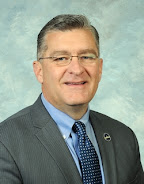Bill aims to ease Kentucky’s nursing shortage by relaxing licensing and instruction requirements, enrollment caps

Sen. Robby Mills
—–
By Melissa Patrick
Kentucky Health News
A state Senate committee plans to hear a bill Wednesday to address the nursing shortage in Kentucky, which has been exacerbated by the pandemic.
Senate Bill 10, sponsored by Sen. Robby Mills, R-Henderson, offers four key measures to address the shortage: licensing reciprocity between other states and countries, higher enrollment caps, looser nursing-instructor qualifications and restructuring the state Board of Nursing. If passed, it would become effective immediately.
“I think it’s going to do away with some of the kind of obstacles that are there to keep folks from getting into the nursing profession and getting into work quicker and faster as they’re needed,” said Mills.
Mills and Senate President Robert Stivers announced the bill Feb. 15, calling it priority legislation. They were joined by Sens. Ralph Alvarado of Winchester and Donald Douglas of Nicholasville, both physicians and Republicans.
“I think we’ve come up with a good product, working with various institutions and entities and discussing with the public how we increase the nurses in this state to help provide medical services,” Stivers said.
Asked what ensures that the state’s nursing programs will maintain their quality as they are allowed to increase their enrollment, Stivers said that will be accomplished by requiring schools to only be able to increase enrollment if they maintain at least an 80% average rate of students who pass their licensure exam.
The bill would expand the qualifications for who can be an nursing instructor, allowing a nurse with a bachelor’s degree to teach in a bachelor’s-degree program as long as they are pursuing their master’s degree, and allow licensed nurses from other countries to practice in Kentucky, with some testing requirements.
It also would allow the nursing board to immediately issue temporary work permits and licenses to nurses who are licensed in other states outside the state’s existing compact with 23 other states, as long as they are in good standing. Similar rules are included for licensed practical nurses.
The bill would restructure the board to require two members from each of the state’s six congressional districts, with no more than six of the members being nurse educators, each of those appointed from a different district. All other nurse members of the board are required to be practicing nurses. It also limits members to three four-year terms.
Mills said they had talked to “multiple folks in the health-care field” in drafting the bill. He added that it is a “live” piece of legislation will likely require some “give and take” going forward, noting that the nursing board had already made some suggestions for change. The nursing shortage was also discussed at length during an Interim Joint Committee on Health, Welfare and Family Services.
The Kentucky Nursing Association CEO Delanor Manson told Kentucky Health News, “The KNA was not contacted prior to the filing of SB10.”
The KNA projects that the state will need more than 16,000 additional nurses by 2024, to replace those who will retire or leave the profession, as many have in the pandemic. A CBS News report Friday night, focusing on St. Claire Regional Medical Center in Morehead, said 40% of the hospital’s nurses have quit during the pandemic.
Gov. Andy Beshear declared an emergency in mid-December to allow the state to take special measures to educate and license more nurses.
His executive order requires the board to approve requests for enrollment increases if a school has sufficient resources to do so; to report vacant student seats to the board each month to post online; requires nursing schools to send the board a list of needed faculty; increases the speed in which a school could open new campuses; and improves reciprocity between states. Beshear’s budget proposal also included scholarship and loan-forgiveness money to attract and retain nurses.
The governor has also formed a “Team Kentucky Nursing Advisory Committee” that meets virtually to discuss the challenges contributing to the nursing shortage in Kentucky and potential solutions. Its next meeting is set for 4 p.m. ET Feb. 21.